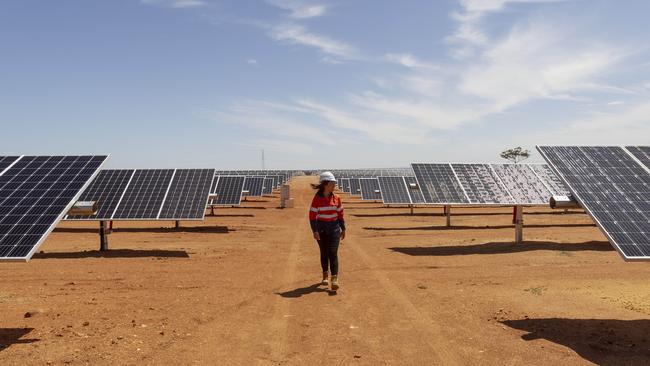Better government co-ordination and bureaucracy, environmental law reforms key to net-zero emissions
Investors, energy experts say what needs to happen in order for the Albanese government to meet its ambitious climate targets.

Investors have warned governments need to better resource the bureaucracy and overhaul environmental protection laws to fast-track the approval of renewable energy projects, or risk missing out on tens of billions of dollars in investment as countries around the world race to secure capital.
Acting Opposition Leader Sussan Ley on Thursday declared Labor’s energy policy was “in tatters” after Jim Chalmers warned Australia could not achieve its net-zero emissions targets without more robust interventions from government.
The Treasurer conceded at The Australian-Melbourne Institute Outlook conference that speeding up the approvals process was a key issue in attracting the investment required to meet Labor’s climate goals.
Leading energy expert Tony Wood urged Anthony Albanese to consider creating a dedicated committee of national cabinet to oversee the net-zero emissions transition, which the Grattan Institute has described as the next industrial revolution.
He also said there needed to be greater co-ordination across the federal government.
“You don’t want to have (Energy and Climate Change Minister) Chris Bowen wanting to have lower emissions and (Resources Minister) Madeleine King wanting to have more gas,” Mr Wood, the Grattan Institute’s director of energy, said.
“Maybe what we need is a dedicated committee of national cabinet. We had one for Covid; this is big and important enough to justify something like that.
“If we’re going to do this, no part of our economy is going to be unaffected by it.”
Clean Energy Investor Group chief executive Simon Corbell said it was widely accepted across the industry that the level of committed projects needed to increase if the government’s renewable energy targets were to be realised.
The Albanese government’s target is to reduce emissions by 43 per cent below 2005 levels by 2030. Implicit in that overarching goal is that 82 per cent of Australia’s electricity will need to be generated from renewable sources.
Mr Corbell, whose organisation represents $24bn in clean-energy assets, said there were a number of hurdles that needed to be overcome in order to drive more investment into the renewable sector, including federal reform of environmental protection laws, which were delaying the approval of renewable energy projects.
“NSW needs to do a lot of work when it comes to wind and solar (project approvals), but particularly wind,” Mr Corbell said.
Quinbrook Infrastructure Partners managing director David Scaysbrook said the snail pace of Australia’s approval process was a key obstacle to bridging the investment gap.
“This has been the most critical thing between winning and losing investment: how fast can you get a project from proposal to construction,” he said.
“It’s not only here in Australia, it’s Saudi Arabia, it’s Indonesia – countries are actively soliciting investment from big industrials to attract big projects, and this is our competition.”
A lack of bureaucratic manpower was to blame for applications not being even looked at for six months, Mr Scaysbrook said.
“We are not talking about short-cutting environmental standards, we are just asking: ‘Can you just hire more people and get it done faster?’,” he said.
Ms Ley accused the government of breaking an election promise and said if the Coalition were in power “we would do gas differently”.
“Five-hundred days after being elected and Labor is admitting they can’t realise their own energy policy,” she told Sky News from the Hunter Valley in NSW.
“They’ve got a completely unrealisable goal of 82 per cent of renewable electricity in the grid by 2030. It’s almost as if they don’t even want to mention that, but by acknowledging, as they pretty much have, that they won’t reach that, that is sending a terrible message to these communities, and indeed communities who rely on resources.
“We would de-risk investment (in gas). We would absolutely focus on gas as a transition energy source to reduce emissions, to put us on a pathway that actually backs in our industries.”
Former Productivity Commission chair Peter Harris supported the Treasurer’s “co-opting” of other policy areas to “change the nature of the economy into a transformative agenda at the micro-economic level”, noting if he didn’t, ministers would make up their own agenda.
“There has to be some synthesis of objective from government. He’s saying ‘all of these things amount to a transformational change to the Australian economy and I have a role in it’,” Mr Harris said.
“He is actually trying to be relevant to whole-of-government that I don’t think treasurers have tried to be for quite a while. I think that’s a good thing.”



To join the conversation, please log in. Don't have an account? Register
Join the conversation, you are commenting as Logout